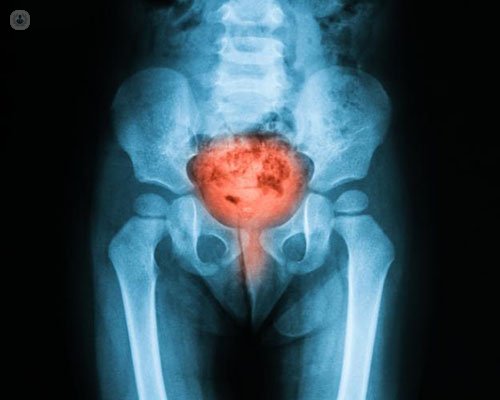Bacterial and interstitial cystitis: causes, symptoms and treatment
Written by:Cystitis means inflammation of the bladder. It is most commonly due to bacterial infection. This is termed bacterial cystitis. However, there is also a very common but poorly recognised condition called interstitial cystitis. It is believed that bacterial infection can lead to interstitial cystitis. Interstitial cystitis is quite common and affects one in four women at some stage of their lives.

Our expert urological surgeon Mr Keng Jin Ng answers the most commonly asked questions on both bacterial and interstitial cystitis...
Causes of cystitis
Bacterial cystitis is most commonly caused by E. coli. Other bacteria such as Enterococcus, Klebsiella and Proteus may also be involved.
Interstitial cystitis is the inflammation of the bladder due to cracks in the waterproof lining, allowing urine to go through the cracks and sting the deeper nerve endings badly. The disturbed nerve endings then react and set up the inflammation (neurogenic inflammation). It is believed that the cracks are caused by an initial bacterial infection.
Following antibiotic treatment which may have eradicated the bacteria, the deep cracks in the waterproof lining usually fails to heal due to the nerves in the deep cracks releasing chemicals (inflammatory mediators) which prevents the cracks from healing.
Symptoms of cystitis
The symptoms between the classical bacterial infection and interstitial cystitis are distinctly different.
Bacterial cystitis:
- Pain and spasm in the pelvis
- Frequent passing of urine
- Burning sensation in the water passage (urethra) during voiding – described as passing razor blades or hot water
Interstitial cystitis:
- Sensation of needing to pass urine all of the time
- Tingling, squeezing, or sharp shooting in the water passage
- The pain in the urethra is worse just before just after passing urine
In severe cases of interstitial cystitis:
- Spasms of muscle causing lower backache, groin and thigh pain – due to disturbed pelvic nerve endings
- Severe bloating, constipation and intermittent loose motions - much like in irritable bowel syndrome (IBS).
Patients with interstitial cystitis may also find that emotional stress aggravates the symptoms. In addition, certain food and drinks such as alcohol, coffee, citrus fruits and spicy food tend to make the symptoms worse. This is because the high acid and potassium content in these food and drinks sting the nerve endings.
How is cystitis treated?
Bacterial cystitis is treated with antibiotics. Interstitial cystitis is treated by medicine to cover up the cracks in the lining of the bladder. Additional treatment may be required to calm the deep nerve endings to prevent release of chemicals which may interfere with healing of the bladder lining.
Are some people more prone to cystitis than others?
People who are with Lewis blood group A+B- or A-B- are genetically more prone to infection. They have rough, sticky waterproof lining in the bladder allowing bacteria to easily cling on to cause infection. The majority of people who have a slippery waterproof lining of the bladder are less prone to infection.
Can men suffer from cystitis?
Yes. Men who suffer from blockage of the bladder may result in poor bladder emptying leading to bacterial infection. Bacterial infection may again cause ulcers and cracks in the lining of the bladder resulting in interstitial cystitis. The usual causes of blockage of the bladder in men would be the tight ring of muscle called the bladder neck and further downstream in the urine system, the prostate gland.
How can cystitis be prevented and is it likely to recur?
There are many different prevention regimes. Women who are prone to bacterial infection can have treatment to promote the growth of good bacteria in the vagina called lactobacilli to provide natural protection. Lactobacilli can produce hydrogen peroxide and lactic acid to kill off bacteria such as E. coli. A new vaccine is also showing promising results.
In addition, women who had suffered recurrent bacterial or interstitial cystitis may result in scarring down of the water passage (urethra). This would in turn cause blockage of the bladder resulting in poor bladder emptying. In such cases, a minor operation to stretch the water passage (urethral dilatation) back to the normal calibre would help prevent further cystitis.
Equally, in men who have bladder obstruction due to a tight bladder neck and obstructive prostate, there are specific treatment (such as tablets to relax the bladder neck and shrink the prostate gland) to allow efficient emptying of the bladder.
Once the bladder system is optimised, for both men and women, they are unlikely to suffer repeat infections. Also, once the bladder lining heals following specific treatment for interstitial cystitis, the bladder should be "good as new".


